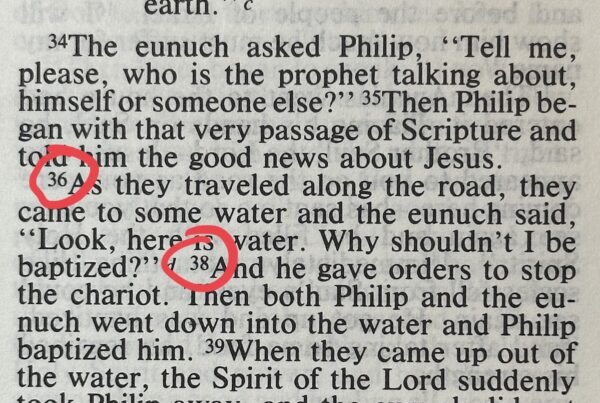John submitted a question regarding the relationship between faith and works. He writes, “The Protestant movement reminds us how deeds can’t get us into heaven.” But he goes on to mention Jesus’ teachings, like the sheep and goat parable in Matthew 25. It seems that Jesus is saying that “if we don’t do these deeds, we will go to hell.” The implied question is: What is the relationship between faith and works?
—————————————————————————————————————————————————-
This is a good question about what connection one’s works, or deeds, have to faith and salvation. As you indicate, the central Protestant insight during the Protestant Reformation is that we are saved only by God’s grace through faith. This is a biblical insight, and a very important one. As Ephesians 2:8-9 famously says,
“For by grace you have been saved through faith; and that not of yourselves, it is the gift of God; not as a result of works, so that no one may boast.”
Scripture is clear that we cannot save ourselves by being good enough. Our own works cannot help us; our only hope is to fling ourselves in faith upon the mercy of God and let Him save us. And this need that we have to be saved by God’s grace through faith applies to all people, as the book of Romans makes clear. We discover that “all have sinned and fall short of the glory of God” (Rom 3:23) and that we can only be “justified as a gift by [God’s] grace through the redemption which is in Christ Jesus” (Rom 3:24).
So then the following question arises: But how this does this fit with certain passages that might seem to connect one’s works with salvation? You mention two parables of Jesus in particular: the parable of the talents and the parable of the sheep and the goats. Let’s look at each of these. In the parable of the talents, the servant who did not use his resources at all to serve the master is harshly condemned by the master. The master says to throw that servant “into the outer darkness” where there is “weeping and gnashing of teeth” (Mt 25:30), which seem to be allusions to hell in Scripture (e.g., see Mt 8:11-12). In the parable of the sheep and goats, Jesus says that at the judgment He will separate the sheep (those who are saved) from the goats (those who are lost). In explaining to the goats why they are lost, Jesus focuses on how they did not care for the needs of others, and He says that their failure to care for others amounts to a failure to care for Him. By contrast, He emphasizes how the sheep (the saved) did care for those in need, and in so doing they cared for Jesus Himself (see Mt 25:31-46). So, would it not seem that one’s works are connected to salvation in this parable as well? How does the focus on works in these parables fit with the biblical teaching that we are saved by grace through faith and not by our own works?
In resolving this, it is important to consider the nature of faith in the Bible. Biblical faith is not mere lip service. It is not a matter of simply verbally stating one’s belief in the truth of the gospel and calling on Jesus to save you. Biblical faith is a living and active faith, and it is accompanied by repentance—turning away from being a slave to sin and becoming instead a servant of God. When those who heard Peter’s Pentecost sermon believed the gospel and wanted to turn to Christ, they asked Peter what they must do (Acts 2:37). Peter responded by emphasizing the need to repent in order to receive forgiveness of sins (Acts 2:38). Repentance not only means saying you are sorry for your sins; it also means that you are to turn from a life of slavery to sin. Can one who does nothing to serve God or to eliminate sin from one’s life truly be sorry for one’s past life of slavery to sin? Jesus and John the Baptist both issued the following warning:
“Repent, for the kingdom of heaven is at hand” (Mt 3:2, 4:17).
John the Baptist spoke about how this repentance involves there being good fruit in one’s life and how turning from sin should play out in practical ways—such as soldiers and tax collectors changing their ways and becoming honest (Lk 3:9-14). The book of James famously explains how “faith without works is dead” (James 2:14-26). James explains that faith without works cannot save a person because saving faith is an active faith. A living and active faith will bear fruit. That is why Jesus says that “every good tree bears good fruit, but the bad tree bears bad fruit” (Mt 7:17). He says that “every tree that does not bear good fruit is cut down and thrown into the fire” (Mt 7:19), and “not everyone who says to Me, ‘Lord, Lord,’ will enter the kingdom of heaven, but he who does the will of My Father who is in heaven will enter” (Mt 7:21). So saving faith is a living faith, and our works are the fruit of a genuine and living faith. Recall that Ephesians 2:8-9 says that we are saved only by grace through faith, but the very next verse also says that we are still expected to do good works as Christians because we are “created in Christ Jesus for good works” (Eph 2:10).
So, to sum this up, the Bible is clear that we cannot save ourselves. Nobody will be declared righteous in God’s sight by good works and by perfectly obeying the moral law (Eph 2:8-9; Rom 3:20). We cannot earn salvation. We cannot rely on our works to save us. We need to be covered by the sacrifice of Jesus. He lived a perfect life and paid the penalty for our sins, and we need to accept that free gift of grace by faith. But faith without works is a dead faith (James 2:14-26). Faith involves genuine trust in Christ, and there must not only be belief in the truth of the gospel and a desire to be saved by Christ; there must also be repentance—genuinely being sorry for your sins and having a willingness to make Christ your Lord (not just your Savior). This does not mean a Christian will be perfect or needs to be perfect in order to be saved; rather, it means that there needs to be some fruit in your life or else your lack of fruit will reveal that you are a dead tree with dead faith. In the parable of the talents, the man who did nothing whatsoever to advance the master’s interests (i.e., one who does nothing to live for God or bear any Christian fruit) is lost. This cannot be because he did not earn his salvation through good works, for such an interpretation would contradict other Scriptures; rather, a better interpretation is that the lack of fruit in the man’s life reveals that he does not have genuine, living, saving faith in Christ. He is lost because he lacks faith, and his lack of works is simply the visible sign that shows this lack of a living faith. Likewise, in the parable of the sheep and the goats, we ought not think that the goats are lost because they did not earn their salvation through enough good works, such as helping the needy; rather, we should think that they are lost due to a lack of saving faith in Christ, and this lack of faith is evidenced by the fact that they showed no fruit in their lives. Jesus is highlighting their lack of fruit, which reveals their lack of faith. So, ultimately, it is important for Christians to affirm that nobody is saved on the basis of their works. We are saved by grace through faith. But we also must appreciate that a living faith will bear fruit.





